Text
Found on an old file card ...
“What we need if we want to stay flexible and young in our minds, the old captain said, is to be ‘limber, loving, and a little loony’. ”
0 notes
Text
After some months away, some recent work ..
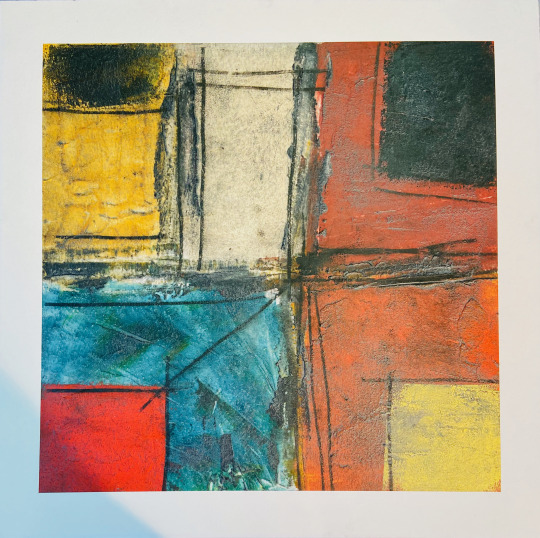
Archways (2021), 22x22 inches cold wax on art board.
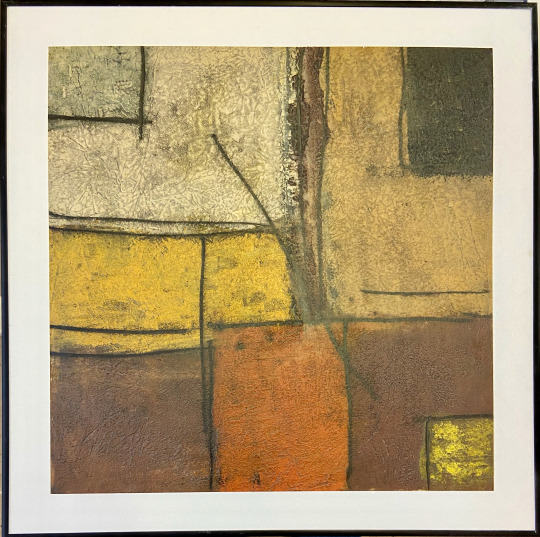
Squaring off (2021), 22x22 inches cold wax on art board.
1 note
·
View note
Text
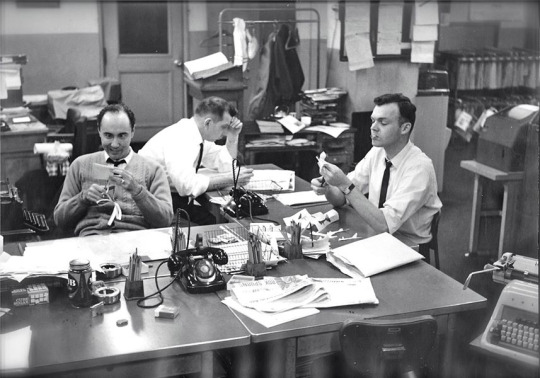
Was in the mood for an old photo: Taking a break between editions at The Japan Times, 1962-65; left, Tom Harada, the night editor; right, me. I don't remember the name of the copy editor in the middle. I think one of the copy boys took the photo.
0 notes
Text

A recent untitled abstract, cold wax, 22" x 22" on art board.
0 notes
Text
Who Am I?
Yeah. I’m an old white guy.
I love good jazz piano. I’m listening to Bill Evans on my HD radio player for the umpteenth time because I’m taking a break from puttering in my studio, a former auto garage. The space is large enough to hold a car, a piano, a couch, a table with four chairs, a stand-up work bench, a large table setup for meetings, and a small table with a coffee pot and mini-refrigerator.
I’m sitting at an old wooden desk, a laptop to one side. I don’t have a Wi-Fi connection, so the laptop is used only for printing out tags to paste on the back of a painting. Or I play solitaire, convinced this game preserves at least some of whatever mental agility I still have.
I worry about my mental health because I’m 85 years old. So yeah, I’m an old white guy who was born in the Great Depression. My breathing is labored because I have chronic obstructive pulmonary disease, the result of more than 40 years of smoking, despite having quit more than 20 years ago.
Most days, I putter a bit with a wax painting, then play some solitaire, then go by the grocery store (wearing my cloth mask) for whatever my wife and I need and a bit of lunch. After lunch, back to the studio to putter and play another round of solitaire. It’s my version of “being retired.”
The COVID-19 pandemic doesn’t much affect me or my wife. Our daily routines are not much different from our routines during the days before the pandemic. We live in a small city in central Illinois, flyover country, and people here generally observe our state’s rules for coping with this itinerant virus. As you might expect, a few people feel compelled to argue that nobody, least of all a governor, has a right to tell them what to do.
Most of the news since 2016, especially on 24/7 cable, has been about the New York con man, the murder of too many Black people, the hypocrisies of too many politicians, the way asylum seekers are abused at our southern borders, the corona virus, a Supreme Court nomination and, of course, the election.
As old white guy, I pay attention to the chatter and clatter about identity politics, that mixture of race and gender politics, the group versus the individual, what is or isn’t a “real” American, whose lives matter, and who can use which bathroom, and how much religion is too much religion, who’s “woke” or who’s “canceled.” Yeah, I too live in a Facebook “bubble.” I’m computer literate enough to enjoy “friends” in that confined environment.
I used to be a writer and editor for the local newspaper. It bothers me that I’m still an observer of the outside world, not a participant. Our virtual world bothers me because unless one of us is running for president I don’t think old white guys count for much these days.
There are a lot of us old white guys who quietly worked the shops, plants and offices of American business for 30 or 40 years. We now use our mornings for coffee at the local breakfast place with other old white guys and then spend the rest of the day puttering or muttering, “Yes, dear.” A few of us play a little golf at the public course.
We’re not that younger white guy who became known as the “black” president, or the actual Black man who became president. We’re not the Indian, or Japanese or Lebanese and African immigrant entrepreneur who wowed Wall Street. Over the years, this old white guy has visited New York and Chicago and San Francisco and noticed that most of the people hustling along the streets are not old white guys. If this is what they call diversity, this old white guy thinks it’s great.
This old white guy is appalled that he didn’t figure out until he reached old age that this country is only a bit less racist than when it was founded by the patriarchal, slave-holding economic elite of the day. It is no consolation that his Dutch forebearers, who settled on Manhattan Island in 1625, preceded that founding and treated the inhabitants they found there with some degree of decency.
This old white guy reads the obituaries in the local newspaper every evening. He’s looking for clues to what made each of the departed a unique human being. Most are men and women in their 70s and 80s, a few in their 60s and some in their 90s. It saddens him that the few dozen words about them will likely be the only record of their life shared with the world.
So, yeah, I’m an old white guy. But who am I really? Am I anything more than just another old white guy of privilege?
Does it matter that I grew up on a Midwestern farm, in an 1885 farmhouse built by a great-grandfather? That I managed to get through high school and a state university? That I served three years in the United States Army on each of the coasts and on Okinawa? That I spent several years in Tokyo working on an English-language newspaper? That I met my wife at the local newspaper and spent 33 years of my life at that newspaper after a year in Washington with the Voice of America? That our two sons went separate ways, one to San Francisco and one to New York? That we’ve both survived the transformative frustrations of ever-changing technology? That now, in our old age, my wife and I are financially secure but still must count some of those infamous pennies and deal with the intricacies of for-profit healthcare with the help of that socialist evil called Medicare? Will my obituary be the final word?
So, who am I? What am I? Yeah, I’m whatever the accident of birth and the ups and downs of 85 years made me. But who am I really these days? Will someone please tell me.
(Written September 2020)
1 note
·
View note
Photo
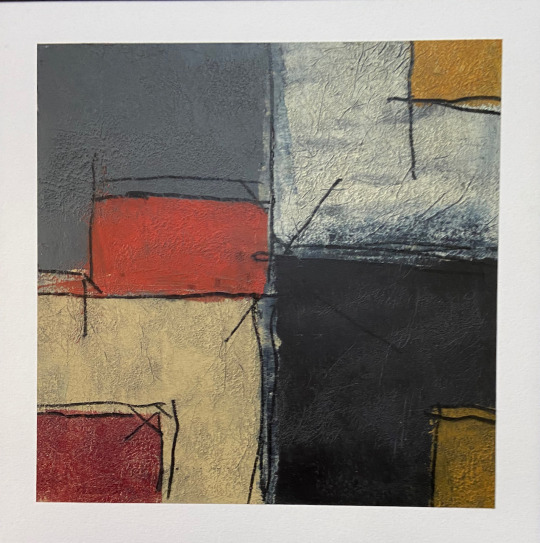
Haven’t posted for several months. This is a 22″ x 22′ cold wax abstract piece done this year. Meanwhile, note my November 2020 essay below.
0 notes
Text
An Old Man’s Thoughts ...
... on November 3, 2020:
First, definitions: An oligarchy, says the Encyclopaedia Britannica, is “government by the few, especially despotic power exercised by a small and privileged group for corrupt or selfish purposes. Oligarchies in which members of the ruling group are wealthy or exercise their power through their wealth are known as plutocracies.”
Lest we forget: The United States has always been a form of oligarchy, disguised as a representative republic, periodically benign and oftentimes not benign, depending on how willing our plutocrats have been to share the country’s wealth. The country was created by the economic elite of the day, resisting attempts by England to assert economic power over its New World colony. Keep in mind that eight of the first 12 presidents owned slaves while in office. Slavery served the economic interests of both Southern plantation cotton growers and cotton mill owners in the Northeast.
The two decades following the end of World War II were arguably the most benign economic period. Then came the Vietnam conflict and the cultural shifts of the 1960s, particularly the advancement of civil rights for Black Americans. This period deeply frightened the plutocrats, those with names like Olin, Coors, Mellon and Koch among others. Thus began the creation of “conservative” think tanks, such as the Heritage Foundation, founded in 1973 by Paul Weyrich, Edwin Feulner and Joseph Coors. Since at least the Reagan era we have been a plutocracy, in large part because of the unintended consequences of the Democratic-led, post-Nixon campaign finance reforms that ironically opened the way for the buying of Congress.
This old man believes that the reason the country is now so divided is the failure of government to regulate greed. In a capitalist oligarchy, stability is maintained, and most of us are content, when the government is allowed to regulate greed. It can do that only when the plutocrats, the corporate elite, decide they have wealth enough and are willing share with the general population through a living wage that can support a generous consumer economy, accompanied by an adequate social safety net and retirement security for the elderly. Unfortunately at least since the U.S. Supreme Court’s decision in Citizens United, we have felt the impact of “despotic power exercised by a small and privileged group for corrupt or selfish purposes.”
It is not at all clear that the national election of 2020 will change that reality.
0 notes
Photo
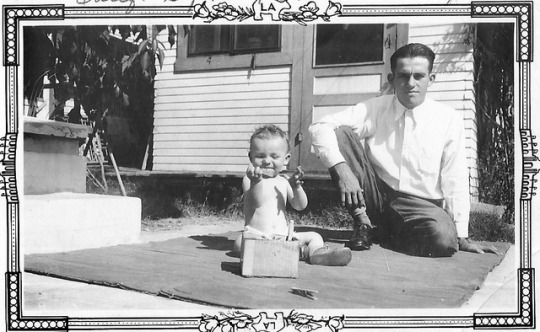
Me and my father in Los Angeles, California, in September 1936. I would be one year old in November of that year.
0 notes
Text
My mother with her favorite riding horse, Dolly, and the farm’s German shepard, Fritz, in the front yard at Carter Hill.
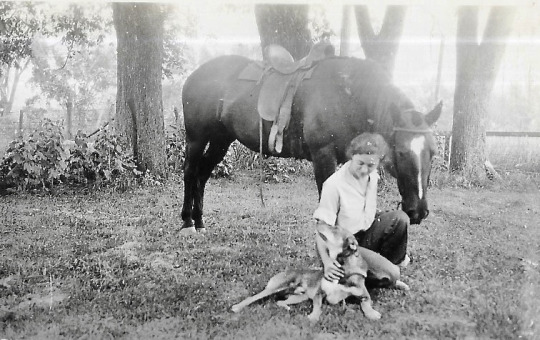
0 notes
Text
Found his photo in one of my late mother’s family photo albums. T’was the first day of school in 1941 — and those bib overalls were obviously brand new ...
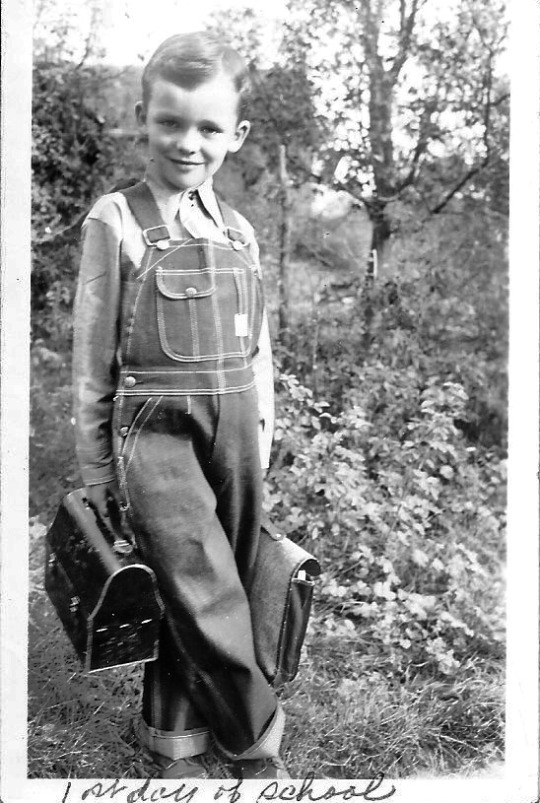
0 notes
Photo
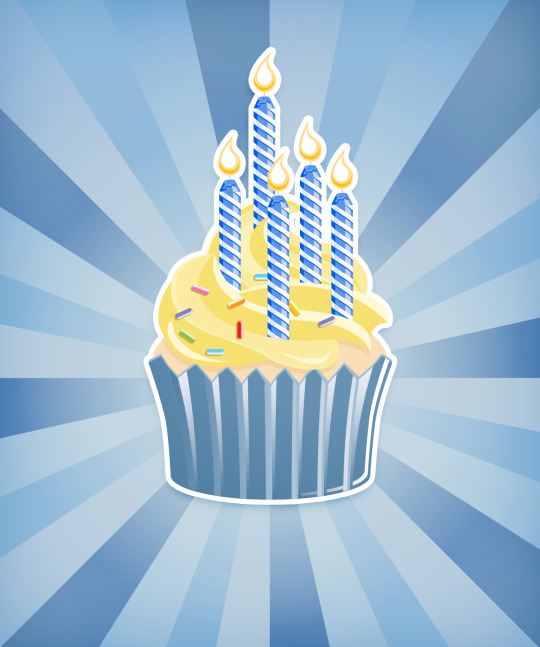
billingsgate turned 5 today!
0 notes





